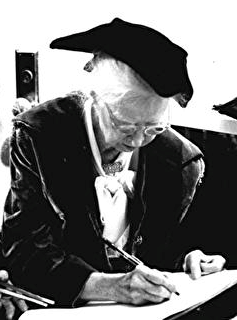Glossator 11 (2016): Marianne Moore – CFP
by nm
Marianne Moore’s indictment of her own craft remains to this day a shrewd affront to critical exegesis. Piqued by ‘the immovable critic’, she treads a fine line in ‘Poetry’ between approbation and displeasure, a feeling entangled in the confession that ‘we do not admire what / we cannot understand’. Notwithstanding her penchant for axioms of this sort, Moore inclines elsewhere to a mode of expression that is dense, riddling and allusive; a poetics fit for sustained ‘inspection’, perhaps, but one whose fluid textual condition also resists ‘high sounding interpretation’. Given Moore’s tendency to revise published material – shuffling, redacting, reworking, restoring – it has often been difficult to say what ‘all this fiddle’ amounts to.
In taking Moore’s doubts about interpretation seriously, this special issue of Glossator proposes a broad approach to her verse and the stylistics of commentary. Glossing, annotating, doodling, and footnoting – Moore was always sensitive to smaller forms of labour and textual diversion, and the apparatus of her Collected Poems (‘A Note on the Notes’) bears witness to a bashful enthusiasm for marginalia, for ‘provisos, detainments, and postscripts’. Glossator welcomes contributions of two kinds, then: essays about the commentarial mode; and actual commentaries, queries and notes on particular poems.
Essays of 4000-6000 words may explore, but are not limited to, the following texts and topics:
- Borrowing, allusion, and intertextuality in Moore’s verse – networks of influence – and our means of describing them
- Moore’s critical work – for The Dial, and in The Complete Prose (1986)
- Moore’s paratexts – ‘A Note on the Notes’ in the Collected Poems (1952); ‘Foreword’ to The Fables of La Fontaine: A Complete New Translation (1954); ‘Foreword’ to A Marianne Moore Reader (1961)
- The significance and scope of scholarly editions by Robin Schulze (2002) and Heather Cass White (2008, 2012)
- The relationship between life-writing and textual commentary, with particular attention to Linda Leavell’s Holding on Upside Down: The Life and Work of Marianne Moore (2013)
Contributors are encouraged to consult the journal’s general guidelines for commentary, which are detailed in the About section, and to peruse the journal’s Archive. If you are interested in contributing to this volume, please send a brief abstract to Dr Edward Allen, the issue editor, at ejfa2@cam.ac.uk
SCHEDULE
2 October 2015: Abstract proposal due to editor
1 January 2016: Decision regarding abstracts and selection of contributors
24 June 2016: Final Submission
August 2016: Publication


